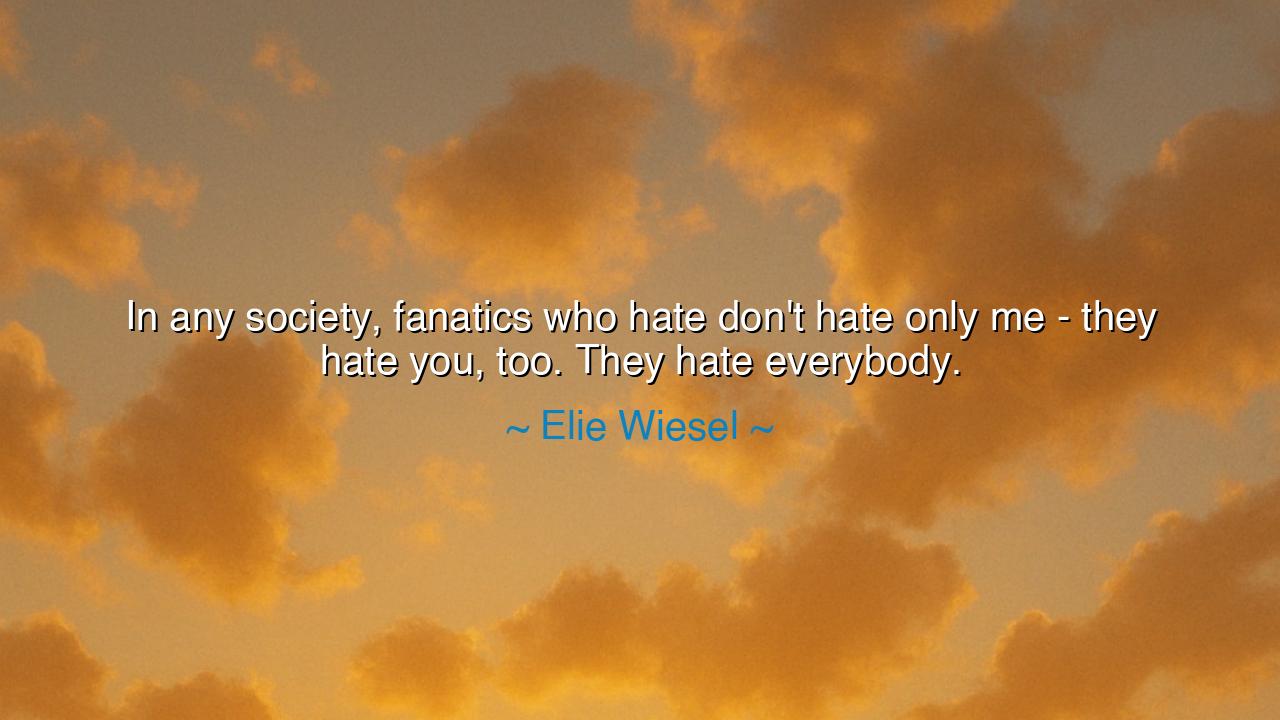
In any society, fanatics who hate don't hate only me - they hate
In any society, fanatics who hate don't hate only me - they hate you, too. They hate everybody.






Hear the voice of Elie Wiesel, survivor of unspeakable darkness, whose words cut like fire through the illusions of safety: “In any society, fanatics who hate don’t hate only me—they hate you, too. They hate everybody.” This is not the cry of bitterness, but the wisdom of one who has seen the heart of evil uncovered. His voice is the echo of history, reminding us that hatred is not a storm that strikes one home alone, but a fire that devours the whole village.
The origin of this truth is Wiesel’s own life. He was but a child when the Nazi regime unleashed its fury upon the Jewish people. In the ghettos, in the trains, in the concentration camps, he saw hatred sharpened to its deadliest edge. Yet in time, he understood that such fanatics did not despise Jews alone; they despised all humanity. For hatred is not selective—it is a poison that corrodes the very vessel that carries it, and in its rage, it seeks to destroy all that is good, all that is beautiful, all that dares to exist outside its narrow vision.
Consider the rise of the Third Reich. At first, the fury was turned against Jews, blamed for the woes of the nation. But soon, the net widened: Romani people, the disabled, political dissenters, homosexuals, even those within the German people who resisted tyranny—all were branded enemies. What began as hatred for a few became hatred for all. Here, Wiesel’s words shine clear: hatred cannot be contained, for it is a fire that leaps from branch to branch until the whole forest is ash.
And yet, let us not mistake his words as history alone. For in every age, the same danger arises. When fanatics in any land raise their voices against one group—whether by race, creed, or belief—it is a signal that none are safe. Today they may target your neighbor; tomorrow, they will target you. Hatred has no loyalty, no true cause; it feeds only on destruction. Wiesel’s warning is eternal: never believe that hatred against another will leave you untouched.
The meaning of his wisdom is both simple and grave: to tolerate hatred against one is to invite danger for all. To remain silent when another is attacked is to prepare the ground for your own downfall. Thus, his words call for solidarity—for the recognition that humanity is bound together, and that justice for one is justice for all. When hatred is allowed to fester in the shadows, it grows bold and strikes without restraint.
The lesson is this: when you see hatred rise, do not wait until it reaches your own door. Stand against it at once, even when it does not target you directly. Speak for those who are silenced. Protect those who are threatened. Build communities not on fear but on compassion, for love is the only antidote to hatred’s poison. Remember always that the enemy of one human being is, in time, the enemy of all.
What then shall you do? In your daily life, be watchful for the seeds of hatred—mockery of the weak, suspicion of the different, disdain for the stranger. Pull out such weeds before they grow into vines that strangle society. Teach your children to see the humanity in others, and to resist the easy lie that some are less worthy of dignity. Stand with courage, for silence in the face of hate is not neutrality—it is surrender.
So let the words of Elie Wiesel ring like a bell through the ages: fanatics, hate, society, everybody. He spoke not only of the past, but of the present and the future. The lesson is carved into the stone of history: hatred unleashed spares no one. Only when people stand united, guarding one another’s humanity, can society be truly free. Let this truth be your shield, your summons, your vow.






AAdministratorAdministrator
Welcome, honored guests. Please leave a comment, we will respond soon